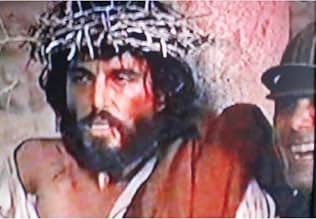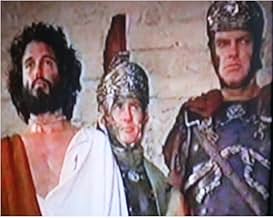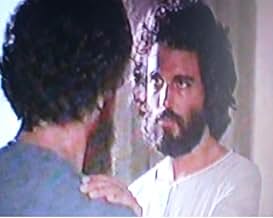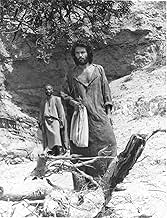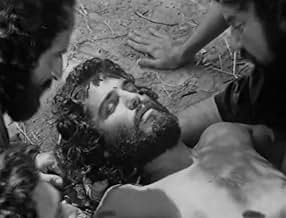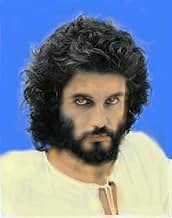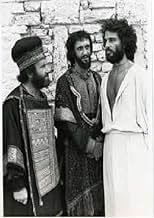Adicionar um enredo no seu idiomaThe Crucifixion of Christ seen more from a political and historical point of view than a spiritual one.The Crucifixion of Christ seen more from a political and historical point of view than a spiritual one.The Crucifixion of Christ seen more from a political and historical point of view than a spiritual one.
- Direção
- Roteiristas
- Artistas
- Direção
- Roteiristas
- Elenco e equipe completos
- Produção, bilheteria e muito mais no IMDbPro
Avaliações em destaque
This film is very depressive. I think who wrote him/it and it accomplished him/it certainly it doesn't believe that Jesus Christ resurrected and it arose to the heaven. In this film they are shown the last 24 hours of Jesus of Nazareth (Chris Sarandon). He begins with their disciples Peter and John going the city of Jerusalem, to find a place to prepare the dinner of Easter, following by the Last Supper, the prayer, the betrayal and the prison in the garden of Gethsemani, the judgement before the one of Highest Priest Caiaphas and of the main priests, Peter's denial, the interrogation before Pilate, the judgement in which the people choose Barabbas to be freed in Jesus' place, the flagellation, the coronation of thorns, the mockeries done by the Roman soldiers, the via-crucis (in the which Jesus only carries a part of the cross and no the cross completes) and it finishes when Jesus has his/her hand preached by the torturer in the log of the cross, and the image frozen there. The following image is the in that it shows Caiaphas and Pilate tends a fast conversation, saying that it is everything finishing and one wanting Happy Easter for the other,... and end. This film has an exquisite and detailed production, sceneries of the streets, of the houses, of the palaces, characterization and clothes of the guards of the Temple, of the soldiers and Roman centurions, of the priests, of Pilate, of the people, in a way that I think it must really have been at Judea and in Jerusalem 2000 years ago. And this film was faithful to the text of the Gospel in some parts, but in other the increment of scenes and of speeches, it fled completely to the sacred text, distorting completely. Judas, the traitor, nor it seems to be with total certainty of the one that intends do. But the great flaw of this film was without a doubt showing Jesus' last 24 hours, their judgement, suffering in an extremely heavy and depressive way, much more than in the other films on Christ that I saw. As for actor Chris Sarandon, until he interpreted Jesus Christ with plenty of competence, but it is not adapted for the paper. He is the first actor to represent Jesus Christ, without having the traditional characterization as all we knew of Jesus. Chris Sarandon doesn't have the long hair as it demands the paper. I don't agree with a film that doesn't show Jesus resurrecting, appearing to the disciples and arising to the heavens. In this point I give note 0 for the idealizadores, the producers and the enterprising of this film.
Which will the intention of the enterprising ones have been and producing with this film?
Which will the intention of the enterprising ones have been and producing with this film?
This movie is one of the most provocative Jesus movies I have ever seen. It does not seek to tell the whole story, but only to portray an interpretive expression of the last day of Jesus Christ. It is darkly witty, playful and seriously faithful to elements of the Jewish tradition and to modern scriptural interpretation. Judas is much more ordinary than other portrayals, not the dark and sinister evil that we sometimes imagine, but a grossly mistaken man, horribly misguided in his zeal. Chris Saranden's Jesus is playful and serious, faithful and committed--very human while also divine. The final dialog is thoughtfully done and serves as the kind of small talk that two powerful men might do when they have just committed an atrocity. I would watch this movie again and recommend it to others.
After seeing this movie once,I really respected Jesus Christ much more than I used to. Even though others may compare this movie a failed attempt with other biblical movies, I enjoyed Sarandon's portrayal of Christ.
I enjoyed the interweaving of the story from the scriptures and the untold story that went on around and behind the history that we have recorded. I found it creative and certainly possible. Since the overwhelming interest in the recent Mel Gibson Movie, 'The Passion of the Christ' has stirred up interest in the biblical story; it is interesting to see what some previous filmed points of view have been. This movie brings up some possible conversations, manipulations and intrigues that went on among various characters present at the time of Christ. I found many of their insights both intuitive and highly probable. The writers leave the end up to the watcher as to what you believe, but the interesting perspective on what was going on 'off camera' so to speak gave me lots to think about. Watch it to widen your perspective about some of the unwritten possibilities - I found it very interesting.
This movie strikes me as one of the most successful attempts ever at coming up with plausible answers for some of the nagging questions that have cropped up in recent scholarship concerning the "Passion" (suffering and death of Christ) accounts in the New Testament. (What motivated Judas if money was not the issue? What could bring the Sanhedrin to meet on a high holy day? Why did Pilate waffle?) It is a movie for the serious, thinking Christian: fans of "The Passion of the Christ" will no doubt be disappointed by the lack of gory spectacle and arch characterization. As for myself, I find the portrait painted here--of the willingness of ordinary people to so blithely sacrifice common decency when their own self-interest is at stake--far more realistic and deeply unsettling. (The disinterested, "just doing my job" look on the face of the man who drives the first nail in Christ's wrist is as chilling as any moment in film.) The film makes no claim to "authenticity", but the settings and costuming invariably feel more "right" than many more highly acclaimed efforts. It is a slow film but, if you accept its self-imposed limits (it is, after all, "The Death"--not the Life--"of Christ"), ultimately a very rewarding one.
Você sabia?
- CuriosidadesBoth Tony Vogel(Temple Guard) and Keith Michell(Pontius Pilate) have been also involved in three other Biblical portrayals.....Vogel portrayed Andrew in Jesus Of Nazareth in 1977 and in 1999 TV movie Jesus portrays a farmer.....Michell portrayed Jacib in 1974 in The Story of Jacob and Joseph and in 1977 portrays King David in The Story of David.
- Cenas durante ou pós-créditosThe 20th Century Fox Television logo is shown without the fanfare.
- ConexõesReferenced in Saturday Night Live: Richard Benjamin, Paula Prentiss/The Grateful Dead (1980)
Principais escolhas
Faça login para avaliar e ver a lista de recomendações personalizadas
Detalhes
- Data de lançamento
- País de origem
- Idioma
- Também conhecido como
- El día en que murió Cristo
- Locações de filme
- Tunísia(filmed entirely on location in Tunisia)
- Empresa de produção
- Consulte mais créditos da empresa na IMDbPro
- Tempo de duração2 horas 22 minutos
- Cor
- Proporção
- 1.33 : 1
Contribua para esta página
Sugerir uma alteração ou adicionar conteúdo ausente

Principal brecha
By what name was The Day Christ Died (1980) officially released in Canada in English?
Responda
